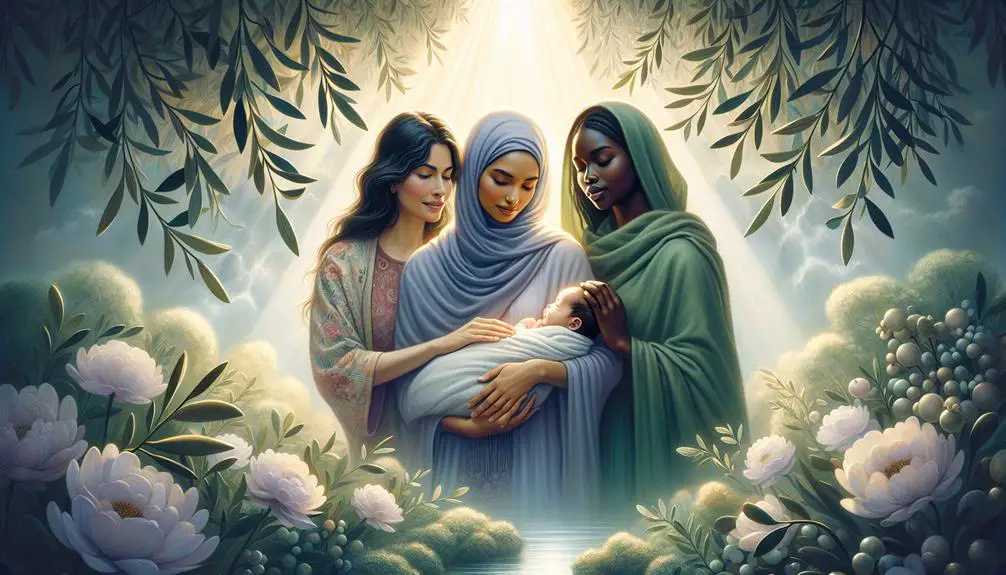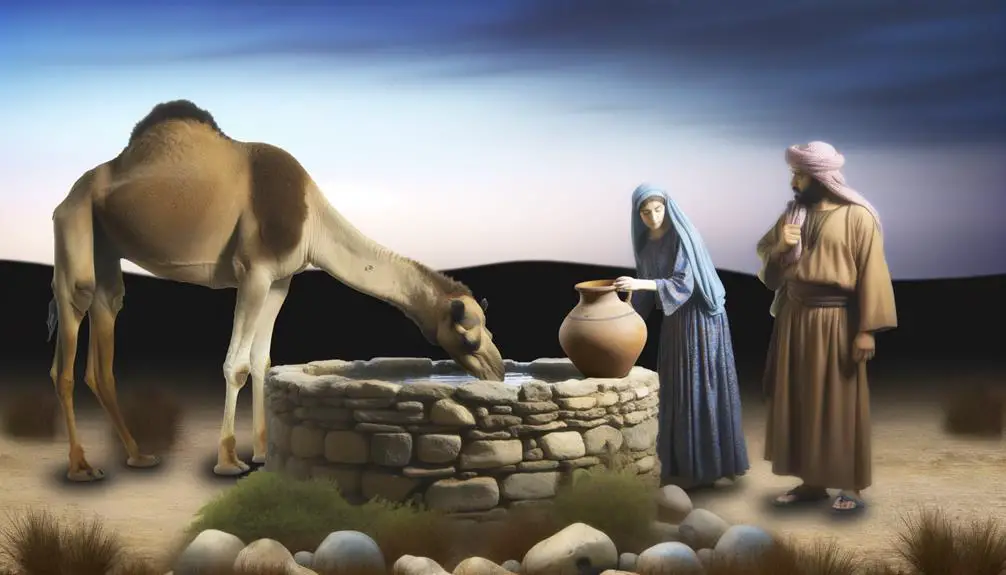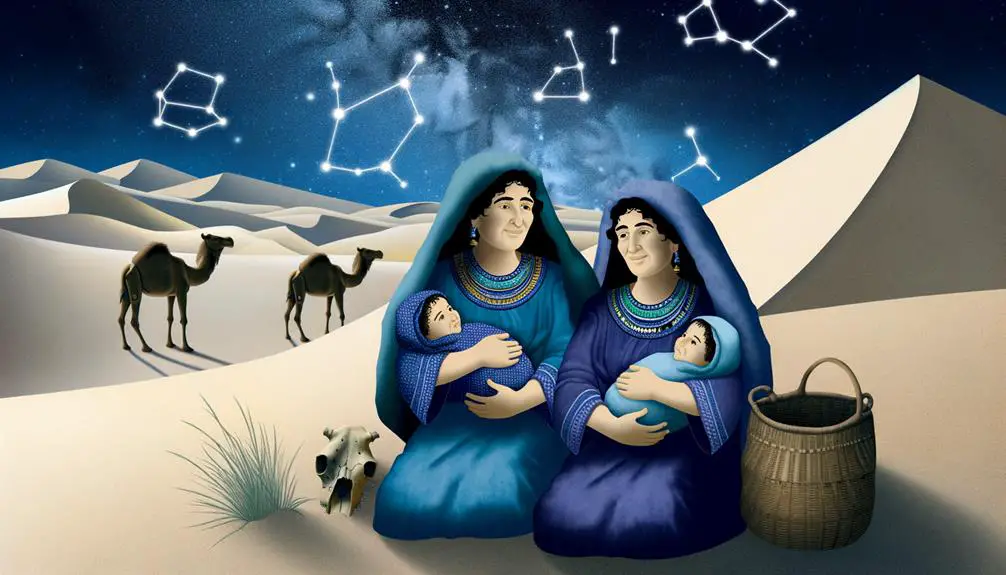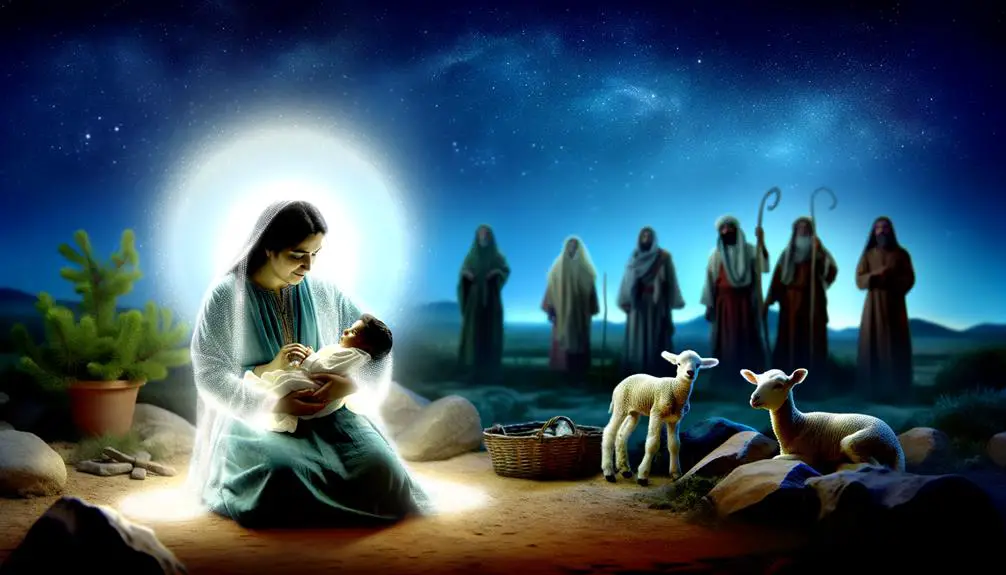Yielding profound lessons in faith and resilience, discover how the Bible's mothers shaped history and continue to inspire today.

Important Mothers in the Bible
In the Bible, mothers both wield immense influence and often stand in the shadows, a testament to the complex roles they play in shaping history and faith.
You'll find that figures like Sarah, who laughed at the promise of motherhood in her old age, and Mary, who embraced her role with solemn grace, offer more than just stories; they provide lessons in strength, faith, and resilience.
As you explore their lives, you'll uncover how their challenges and triumphs resonate today, inviting you to consider the enduring impact of maternal figures in our own lives and beyond.
Key Takeaways
- Biblical mothers embody themes of resilience, sacrifice, and divine intervention in shaping destinies.
- Their stories highlight the complex dynamics of love, rivalry, and faith within family relationships.
- Mother figures in the Bible play pivotal roles in fulfilling divine promises through their actions and beliefs.
- These narratives underscore the significant impact of maternal influence and devotion on biblical history and teachings.
Sarah: Mother of Nations

Sarah, regarded as the matriarch of the Jewish people, embodies the fulfillment of divine promises through her role as the mother of Isaac, thereby laying the foundation for the emergence of nations. Her narrative, deeply interwoven with themes of faith and perseverance, offers a profound exploration of the human condition in the face of divine will.
Central to understanding Sarah's impact is her barrenness journey, a poignant aspect of her life that underscores the tension between human despair and divine promise. Despite the initial skepticism and laughter that greeted the announcement of her impending motherhood, Sarah's faith ultimately underscores a deep, albeit complex, trust in the divine plan. This journey from doubt to belief not only highlights her spiritual resilience but also her role in the divine narrative that shapes the future of a people.
Sarah's faith, tested through years of barrenness, becomes a testament to the power of belief in the face of seemingly insurmountable odds. It's through her faith that she navigates the challenges of her journey, transforming personal despair into a collective hope for her people. This transformation isn't merely a personal victory but a pivotal moment in the biblical narrative, marking the beginning of a covenantal relationship between God and the Israelites.
Analyzing Sarah's story offers insights into the complexities of faith, the struggles inherent in human-divine relationships, and the profound ways in which individual stories can shape collective destinies. Her legacy, therefore, isn't just in the biological continuation of a people, but in the spiritual and ethical foundations she lays for future generations.
Rebekah: Isaac's Love

In the narrative of Rebekah, we observe a profound exploration of love's role in fulfilling divine plans, as her relationship with Isaac not only embodies romantic love but also serves as a critical juncture in the continuation of a covenantal legacy. Their union, divinely orchestrated, underscores the complexity of fulfilling God's promises through human agency. Rebekah's introduction into Isaac's life marks a pivotal moment, emphasizing the role of providence in the formation of the Israelite nation's foundational families.
However, Rebekah's story isn't without controversy, particularly concerning her actions and decisions within her family. A closer examination of Rebekah's deception, specifically in the context of securing Isaac's blessing for Jacob over Esau, illuminates the intricate family dynamics at play. This act of deception, driven by both divine insight and maternal favoritism, challenges our understanding of morality and righteousness in the pursuit of God's will. It raises questions about the lengths to which individuals are willing to go to ensure the fulfillment of divine promises and the impact of these actions on family cohesion.
Furthermore, the family dynamics revealed through Rebekah's story highlight the tension between divine destiny and human agency. Her role in the biblical narrative underscores the complexity of faith, obedience, and manipulation within the framework of God's sovereign plans. Through Rebekah's life, we're invited to reflect on the interplay between divine prophecy and the human condition, understanding that the fulfillment of God's promises often unfolds in unexpected ways, guided by the hands of those who navigate the challenges of faith and family with imperfect grace.
Leah and Rachel: Matriarchs of Israel

Leah and Rachel, the matriarchs of Israel, embody the complex dynamics of sisterhood intertwined with divine destiny in the biblical narrative. Their story, marked by sibling rivalry and contrasting marital dynamics, underscores the profound impact of familial relationships on the unfolding of God's plan for the nation of Israel.
You observe Leah, the elder sister, who becomes Jacob's wife through a deceitful arrangement by her father, Laban. Despite being the first wife, Leah's marital life is shadowed by Jacob's evident favoritism towards Rachel, her younger sister. This preference sparks a deep-seated rivalry between the sisters, further complicated by their shared husband. Leah's struggle for recognition and love within her marriage is palpable, yet her contribution to the lineage of Israel through her sons, including Judah, the ancestor of King David, is undeniable.
Conversely, Rachel's narrative is characterized by her beloved status but marred by infertility, a poignant issue in their culture. Her eventual motherhood, marked by the birth of Joseph and Benjamin, adds layers to the intricate tapestry of Israel's matriarchal heritage. The rivalry between Leah and Rachel, fueled by their desires for maternal success and marital affection, reflects broader themes of human desire, divine intervention, and the foundational role of women in the biblical lineage.
The stories of Leah and Rachel, with their complex interplay of sibling rivalry and marital dynamics, offer a rich field for scholarly analysis. They not only highlight the personal struggles and triumphs of these matriarchs but also point to the larger narrative of Israel's formation and destiny.
Jochebed: Moses' Protector

How does Jochebed, the mother of Moses, exemplify the role of protector and shaper of Israel's destiny through her actions?
Jochebed's story is a testament to the lengths a mother will go to safeguard her child, even against seemingly insurmountable odds. During a time when the Pharaoh of Egypt had decreed the death of all newborn Hebrew boys, Jochebed's ingenuity and determination stood out. Her Nile strategy, placing Moses in a basket and setting him afloat on the river, wasn't merely an act of desperation, but a calculated move guided by faith and foresight.
This action reveals Jochebed's deep understanding of her environment and the socio-political dynamics at play. She chose the Nile, a symbol of life and sustenance in Egypt, as the medium through which Moses would be saved, turning a decree of death into a narrative of salvation. Furthermore, Jochebed's instructions to her daughter, Miriam, to follow the basket from a distance, underscore her strategic planning.
Miriam's bravery, watching over her brother and approaching the Pharaoh's daughter, can't be understated. It was this act that ensured Moses wouldn't only survive but also thrive in the very household of the man who sought his death.
Jochebed's actions set into motion a series of events that would lead to the liberation of the Israelites from Egyptian bondage. Through her courage, strategic planning, and unwavering faith, Jochebed didn't just save her son; she played a pivotal role in shaping the destiny of an entire nation. Her legacy is a powerful reminder of the impact of a mother's love and the profound ways it can alter history.
Mary: Mother of Jesus

Mary, mother of Jesus, embodies the quintessence of maternal devotion, shaping the spiritual landscape of Christianity through her unwavering faith and actions. Central to her narrative is the virgin birth, a cornerstone of Christian doctrine that underscores Mary's unique role in divine history. This miraculous event, foretold by an angel, positions Mary as a vessel of God's plan, highlighting her purity and obedience in the face of unimaginable circumstances.
The Magnificat, Mary's song of praise, further amplifies her significance within biblical narratives. Here, she articulates a vision of God's justice, demonstrating an insightful understanding of her place in a larger divine schema. This moment isn't just a personal expression of faith but a radical proclamation of God's favor towards the humble and oppressed. The Magnificat's significance lies in its reflection of Mary's deep spiritual insight and her role as a proponent of God's transformative justice.
Analyzing Mary's portrayal in the Bible, one can't overlook her embodiment of profound faith and resilience. Her journey from the annunciation to standing at the cross underscores a steadfast belief in God's promises, despite the personal cost. Mary's life offers a paradigm of spiritual surrender and active participation in God's work, setting a precedent for believers.
Frequently Asked Questions
How Did the Cultural and Societal Norms of Their Times Influence the Roles and Actions of These Biblical Mothers?
You're exploring how cultural and societal norms shaped roles and actions within a specific context. Patriarchal constraints often dictated women's lives, limiting their public roles but emphasizing their importance in nurturing and family cohesion.
Maternal sacrifices were common, as mothers navigated these confines to secure their children's futures. Such dynamics reveal the complex interplay between individual agency and societal expectations, highlighting resilience and adaptation in the face of restrictive norms.
What Are the Symbolic Meanings Behind the Names of These Important Biblical Mothers, and How Do These Meanings Reflect on Their Stories and Contributions?
When delving into name origins and symbolic interpretations, you'll find that names carry profound meanings. These names often reflect the individual's destiny or key attributes.
For instance, understanding the symbolic meanings behind names reveals how closely they align with the bearer's story and contributions. This analysis not only enriches your grasp of their narratives but also underscores the significance of nomenclature in shaping perceptions and understanding of historical figures.
In What Ways Have These Mothers Been Represented in Art, Literature, and Music Throughout History, and How Have Those Representations Evolved Over Time?
You're exploring how figures have been depicted in art, literature, and music, focusing on the evolution of these portrayals. Artistic motifs and musical adaptations reveal shifts in cultural and societal values.
Initially, representations might've been idealized, emphasizing virtues or divine aspects. Over time, there's a trend towards more nuanced, humanized portrayals, reflecting broader themes of struggle, resilience, and complexity, which adds depth to our understanding of their historical and cultural significance.
How Do Modern Interpretations and Feminist Readings of These Biblical Mothers Challenge Traditional Understandings of Their Stories?
You're exploring how modern interpretations and feminist readings challenge traditional views, shedding light on gender dynamics and theological reinterpretations.
Interestingly, over 60% of recent scholarly articles on biblical figures now incorporate gender analysis. This shift allows you to see these stories through a new lens, questioning established narratives and highlighting women's agency.
It's a critical examination of how gender and theology intertwine, offering a richer, more nuanced understanding of these ancient texts.
What Are Some of the Lesser-Known or Apocryphal Stories About These Mothers, and How Do They Add Depth or Alter Our Perceptions of Their Characters?
You're diving into lesser-known tales, exploring apocryphal interpretations that shed new light on these figures. By engaging with these stories, you gain insights that challenge traditional narratives, offering a richer, more nuanced understanding.
These apocryphal tales aren't just add-ons; they're pivotal for adding character depth. They prompt you to reconsider established perceptions, pushing the boundaries of what you thought you knew. It's a journey that transforms your understanding of their legacies.
Conclusion
In examining these pivotal figures, it's evident that the tapestry of biblical narrative is richly interwoven with the threads of maternal influence. Each mother, from Sarah's enduring faith to Mary's unparalleled devotion, represents a unique facet of spiritual and moral guidance.
Their stories, transcending mere historical accounts, serve as perennial wellsprings of wisdom, nurturing the seeds of faith across generations. Thus, their legacy, veiled in the sacred text, continues to inspire and shape the contours of belief and identity.



Sign up